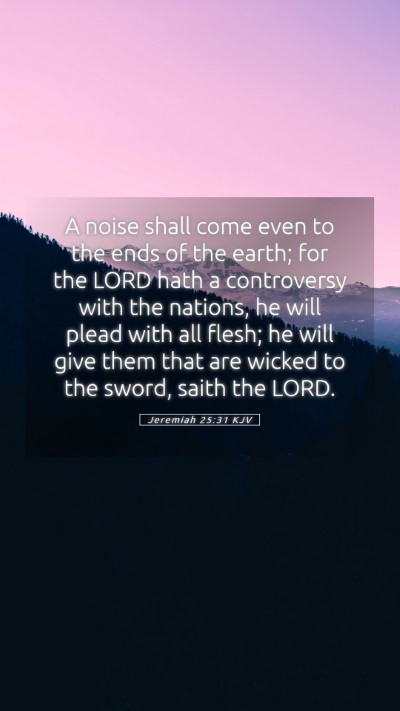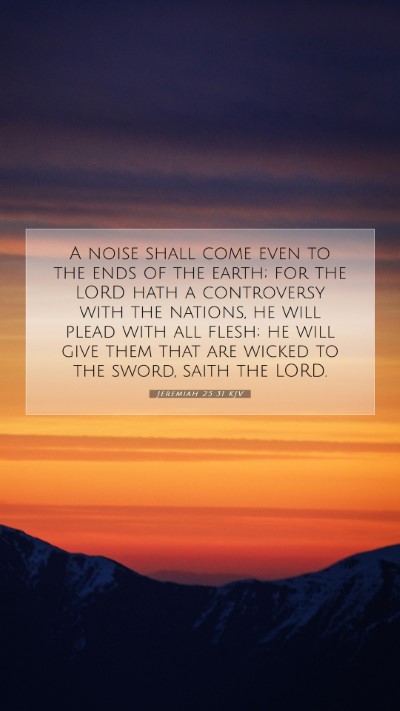Understanding Jeremiah 25:31
Jeremiah 25:31 reads: "A noise shall come even to the ends of the earth; for the LORD hath a controversy with the nations, he will plead with all flesh; he will give them that are wicked to the sword, saith the LORD." This verse encapsulates a powerful message about divine judgment, the accountability of nations, and the ultimate fate of the wicked.
Verse Exegesis and Commentary
This verse stands as a solemn declaration from the prophet Jeremiah, who was conveying the Lord's message to Israel and surrounding nations regarding impending judgment. The public domain commentaries such as those by Matthew Henry, Albert Barnes, and Adam Clarke provide valuable insights into the meanings, interpretations, and implications of this scripture.
Divine Controversy
According to Matthew Henry, the declaration indicates that God holds a controversy with the nations. Henry suggests that this controversy arises from their idolatry, injustice, and immorality. This passage reflects God’s claim over the nations and serves as a reminder of His sovereignty. The term "controversy" denotes a legal dispute where God stands as the ultimate judge, ready to adjudicate between righteousness and wickedness.
The Impending Judgment
Albert Barnes offers a keen observation about the phrase “he will plead with all flesh.” He interprets this as God’s call to nations for accountability and the consequences that follow. It heralds a time when every nation will face divine scrutiny and judgment. Barnes emphasizes that this is not just a localized event; rather, it signals judgment that extends “to the ends of the earth,” highlighting the global nature of God’s authority.
The Fate of the Wicked
As noted by Adam Clarke, the latter part of the verse, “he will give them that are wicked to the sword,” signifies judgment upon the unrepentant. Clarke explains that throughout Scripture, the sword often symbolizes not only physical destruction but also spiritual separation from God. Those who persist in wickedness are warned of their grim fate, reinforcing the call to repentance.
Key Themes and Messages
- Divine Sovereignty: God's authority extends over all nations, exhibiting control over their destinies.
- Moral Accountability: Nations are called to account for their actions and behaviors before God.
- Warning of Judgment: There is an impending judgment for those who persist in unrighteousness.
- Hope for Repentance: Implicit in this warning is a call to repentance, encouraging nations to turn back to righteousness.
Applications of the Verse
In studying Jeremiah 25:31, several applications can be drawn for personal reflection and communal Bible study:
- Personal Reflection: Reflect on the nature of accountability. How do you measure up to the standards of righteousness that God sets?
- Group Discussions: Explore the importance of societal values and the role of faith in guiding those values within communities.
- Historical Insight: Consider the historical context of Israel's struggles and its parallel to contemporary issues within modern nations.
Cross References
- Isaiah 34:2: The Lord's indignation against nations.
- Ezekiel 20:36-38: God's judgment upon His people.
- Matthew 25:31-46: The parable of the sheep and goats emphasizes judgment based on actions.
Conclusion
Jeremiah 25:31 offers profound Bible verse meanings through its includes themes of judgment, accountability, and the hope for repentance. Through the lenses of Bible verse commentary and Scripture analysis, we gain an in-depth understanding of the significance of this verse in both historical and modern contexts. As we contemplate on this verse, let’s be diligent in our Bible study insights and apply its teachings to our daily lives.


